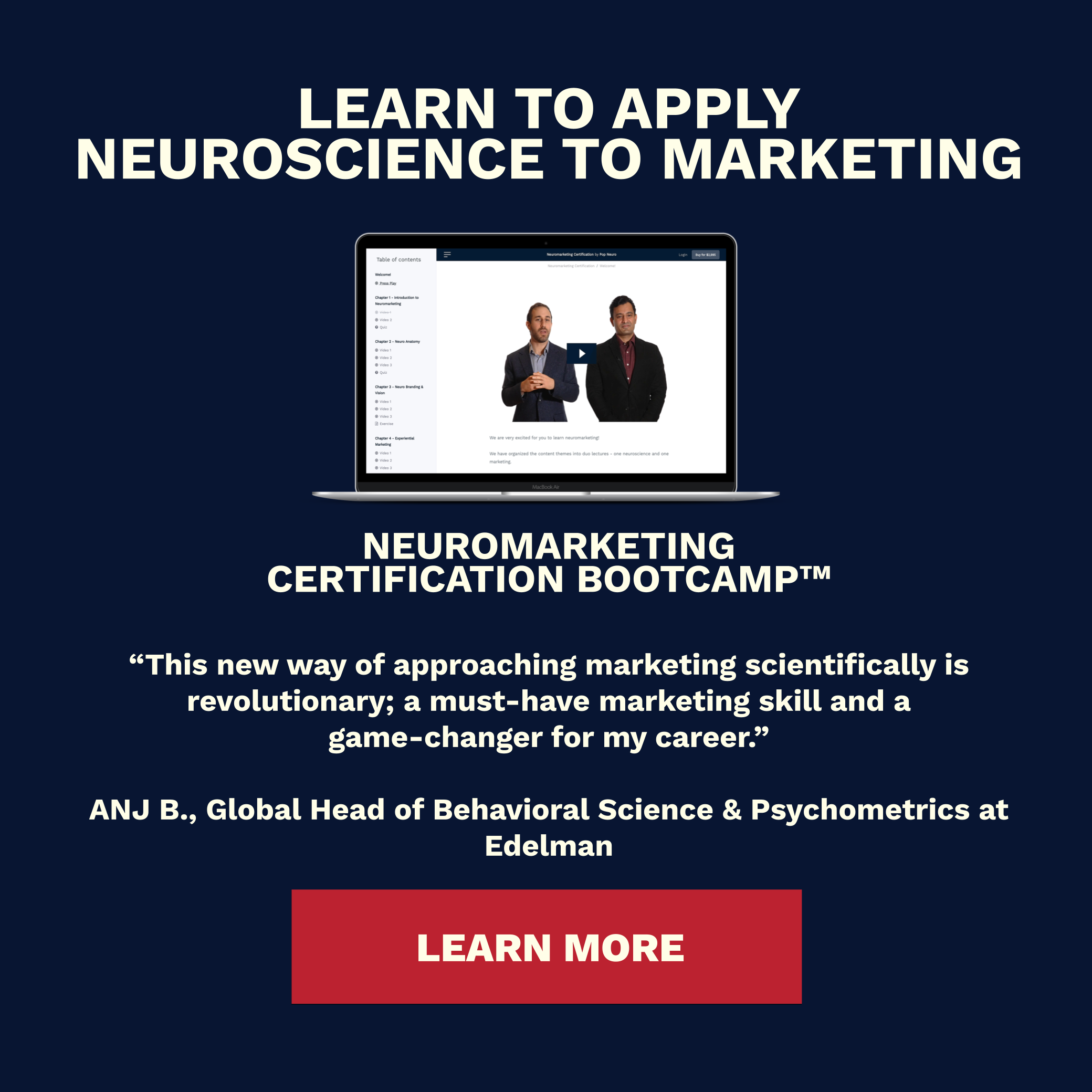Why Marketers Should Learn Neuroscience aka Neuro Marketing

Photo by Milad Fakurian, Unsplash
Imagine being a surgeon before the invention of the x-ray. Even with the best of skills, you miss vital information. Marketing today is like performing surgery without an X-Ray. What’s missing isn’t a new technology; it’s neuroscience.
Everything in marketing comes down to the brain, yet marketers don’t study brains. Understanding neuroscience completely upgrades your approach to marketing.
The key to great marketing is asking great questions. When your questions and AB tests are based on neuroscience, everything from market research to email subject lines is improved. This is neuro-marketing, the new operating system for marketing. The better you understand the brain, the better questions you ask as a marketer, and the better your marketing gets across the entire marketing mix.
Here’s a question for you - Why do you do what you do? People think they know but the reality is, people are poor judges of what influences their actions. And the smallest, most random variable in the environment can have a massive impact on your behavior.
Humans seldom know why they behave a certain way in a certain situation. Even when you ask them directly you’re unlikely to get the key insights you’re looking for.
Here's a story about a brilliant experiment designed by researchers at UC Boulder and published in Science. Participants were offered $20 to evaluate faces. They were shown headshots and asked to rate them on a few variables - attractiveness, friendliness, and generosity.
On the way to the experiment, each of the participants bumped into a clumsy person who dropped a folder of documents. This clumsy person was part of the experiment. As he collected the documents off the floor, he also handed the participant a cup of coffee. The researchers gave half the participants a cold cup of coffee and the other half a warm cup.
The participants who received the warm cup rated people in headshots as being much more generous, friendly, and attractive than those who were given the cold cup. And the most consistent finding of all? Exactly zero participants made any connection between their positive feelings to the temperature of the coffee they held.
While humans can’t always tell you why they think or behave a certain way, you can use a neuroscientific approach to reveal the key drivers of consumer behavior. This comes down to methodology.
Neuroscience investigates what is happening at the biological level of the brain. Neuroscientists use imaging tools such as EEG, short for Electro-encephalography, and fMRI, functional magnetic resonance imaging, to eavesdrop into the brain.
Using these technologies allows you to get the answers without having to rely on a consumer’s best guess. They also reveal the principles that govern the brain. Marketers must understand these principles as they apply universally to all consumers!
Marketers have historically borrowed from the scientific community with tools like market research, AB tests, and UX. But they have yet to truly tap into the brain. That’s where neuromarketing comes in. Neuro-marketing creates marketing tactics based on neuroscientific tools and established principles.
Now you can actually see what is happening inside the brain while the behavior is happening. Sure, AB testing two different add-to-cart buttons by measuring clicks feels scientific. But imagine going from that to actually see what region of the brain lights up when the add to cart button is clicked. THAT is the power of neuro-marketing.
It upgrades the quality and testing of your hypotheses across the entire marketing mix. When everything from Price, Product, Place, and Promotion is informed and filtered by neuroscience, your understanding of consumer behavior will receive a massive update. Neuromarketing is the next OS of marketing. Are you ready to upgrade?
Written by Prince Ghuman
What’s Next?
The neuroscience of color has important implications for a wide range of fields, from design and marketing to health and wellbeing.
LeBron James' breaking of Kareem's record and the following interpretations illustrate the complex interplay between sports statistics and the psychology of statistics.
Memory is your brain’s attempt at connecting you to the past. Learn how memory can improve marketing!
This article will cover what the two consumer behavior motivations that marketers must know.
Learn a simply yet effective marketing strategy as it relates to system 1 & the law of least mental effort.
Moms know a thing or two about the psychology of guilt
Uncover the connection between the neuroscience of memory and emotion and learn how marketing can use it as a memory-booster.
Your brain is a relentless pattern-seeking machine. And these patterns affect consumer behavior in fascinating ways for marketers to note.
Since the brain has declared vision as the VIP amongst senses, you’ll never go wrong by finding more ways to be visual in your marketing.
Everything in marketing comes down to the brain, yet marketers don’t study brains.
The carrot needs to be dangling continuously.
Which of the following hits you harder: losing something or gaining something?
What if I were to tell you that you and everyone else you know is blind AND are entirely unaware of the blindness?
Attention is currency. Attention is a business model. But what is attention, really?
Find out the 3 crucial influences of a company revealing the gender pay gap on consumer behavior.
In 2003, everything changed with “1000 songs in your pocket”.
Find out why smell is to memories what a summary is to books.
What’s the best marketing strategy to make consumers more sustainable?
Can fashion be inclusive? Is fashion truly diverse?
How does the visual salience of credit card features affect consumer decision-making?
The habit of eating the same food for breakfast is pretty common. Why?
Associations are so deeply ingrained in us that we’ve devised “relationships” with definite expiration dates.
The constant chase of happiness in travel has a name. And we’ve been walking over it since.
Why do marketers project personal preferences onto consumers?
Could technology and virtual crowds be one of the NBA's most important plays?
Find out why minimalism is a life-long journey, not a destination.
Why are we so curious about fashion outfits we’ll never wear?
Customers become territorial as they “claim” spaces to work. How and why does this happen?

































Dive into the fascinating intersection of psychology and marketing and how to use psychological biases in marketing strategy.